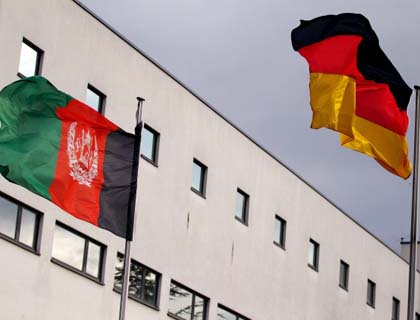The reciprocal relation between Germany and Afghanistan has a long history dated back to early 20th century. However, both countries since then have undergone series of social, economic and political changes, but the bilateral relation, with an exception during Taliban regime, has kept moving over the lines of friendship, cooperation, mutual respect for national interest and national sovereignty.
But, no doubt, the capture of power by Taliban regime was deadly blow to the country's foreign relations and its global status. All ties were cut down, including Germany, and Afghanistan became like a remote Island in nowhere. A historical turn was marked in 2001, by US-led military intervention, which ended in oppressive and inhuman regime of Taliban.
With the collapse of the regime, far-reaching efforts were held to combat with all aspects and forms of Taliban legacies and build a completely new system. Definitely, the problem was not merely a lack of administrative and political establishment but also a distorted social fabric and rampant communal and lingual antagonism as result of decades of civil war and continuous instability. In such a situation, building a new state was indeed a difficult job.
Both the Afghan government, under the leadership of President Karzai, and its foreign allies faced enormous challenges. To resolve the problem and to build a functional political establishment, there was a need of huge resources, solid strategies and long-term commitments.
In this process, Germany can be singled out and put a step ahead. It was the first country that hosted first Bonn conference which paved the way for establishment of civil government. In that historic event, the international community made commitments and promises to provide the required resources for the restoration of the war-torn country. Ten years later, in 2011, similar conference was held by Germany again, aimed to renew commitments and to ensure that Afghanistan would not change once again into a safe haven for Taliban and Al-Qaeda, however, with the fundamental change in approach. As result, our allies emphasized on financial assistance and resumption of the, so-called, Afghanization process.
Additionally, Germany has been a key player in military sphere. Since the very start of United Nations' mission in the country in 2001, its soldiers have carried out their responsibilities effectively in the northern parts of the country. It is also engaged deeply in training of Afghan National Security Forces (ANSF) in order to empower and increase the capacity to deal with Taliban-led insurgencies independently. The policy is based on the notion that training ANSF is an easy way to get the country out of the current tumultuous situation, instead of spending billions of dollars and risking the lives of their soldiers here.
One of other key areas that Germany has been involved with is cultural and education program, which is of high importance in reconstruction processes. It is obvious with the current high level of illiteracy rate; we cannot have a plural society with institutionalized democratic values.
The vital way to have an open society with democratic structure is education. In this case, scholarship Programs by German government has played central role since 2002. Through this program, 2,500 Afghan students have succeeded to follow their graduate and postgraduate studies in Germany. Some have returned and play constructive role wherever they work.
Some did not and have joined to already 90,000 Afghan-Germans. It has been almost ten years that Germany has been playing effective role in educational exchange and improving cultural understanding between the two countries. Annually, several Afghan students earn the opportunity to pursue their higher education in prestigious universities of Germany. It is engaged to improve the condition of the ministry of higher Education.
It also, apart from financing Afghan students to study, is seriously involved in encouraging and paying German professors to get the intellectuals of both countries nearer. Moreover, one of the key areas where Afghanistan lacks most is the leadership and public administration.
Years of continuous struggle and domestic violence have shattered down the otherwise normal improvement of civil and political establishments. During past decades, each government has appeared in contradiction to their successors and struggled to throw away whatever linked to former systems. See, for instance, Taliban completely established new government and changed the administrative system entirely. Same is the case with the current government which cut ties with all who keeps ties with Taliban militants.
So, it is obvious what the prime needs of such a country are? Afghanistan is ripe for corruption and exposed to challenges. Corruption has become a cancer within the government. Bribery, embezzlement, misuse of position and power, nepotism and communal orientation are various forms of corruption that have set the country among ten top failed states.
So, identifying the issue, Germany has special Program for graduate students in the field of "Public Policy and Good Governance" (PPGG). Annually, dozens of Afghan students are selected from among more than hundred competing students to pursue their graduate studies in Germany. Afghan students have already tilted towards learning German language, and those who return and play key role in the country possibly would further strengthen the bilateral relationship between the countries.
Moreover, the students would have an opportunity to study higher education from one of the world's most developed universities, which would widen the horizon of their knowledge and would give them an opportunity to drive their own country towards the same destinations. Apart from education, such programs would definitely help the youth of both the countries to exchange cultural values and experiences and would help them understand each other.
Afghanistan needs modern education the most at the ongoing crucial juncture; the support in this regard from the developed countries of the world, like that of Germany would definitely play a key role. Therefore, Germany and other developed countries of the world should continue or even increase such efforts, and support Afghanistan in fighting the threats of growing insecurity, corruption and ill-governance with the weapons of modern education, which is more powerful than any other weapon in the world.

